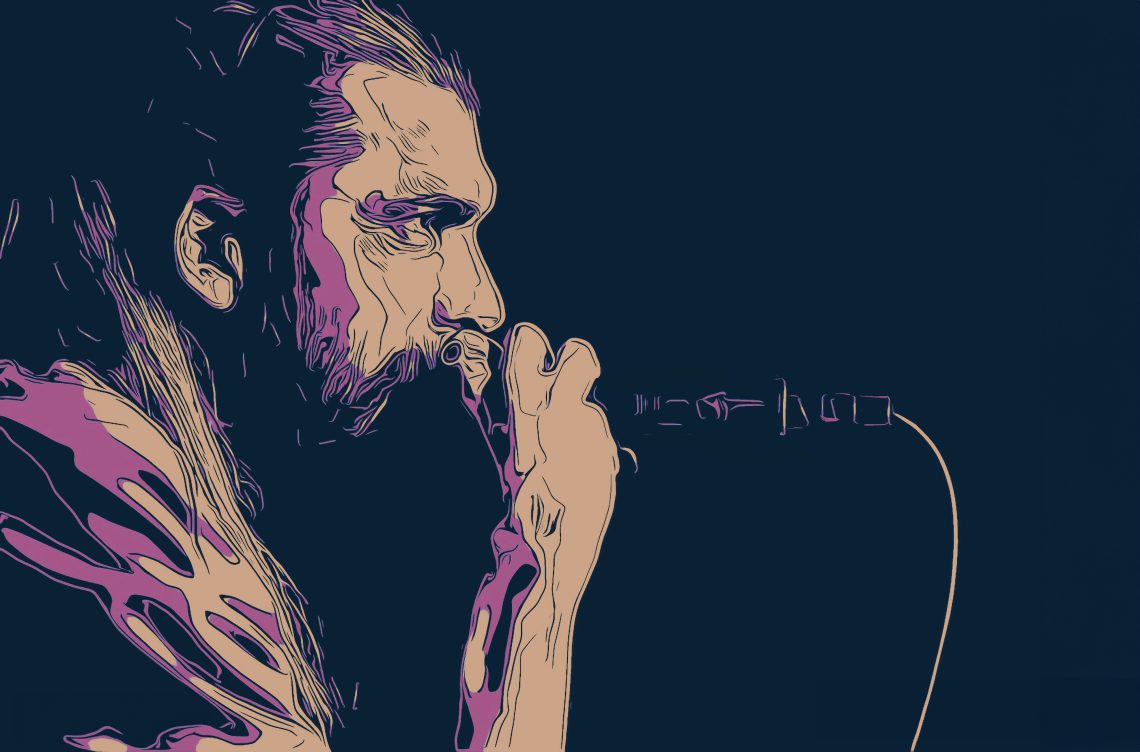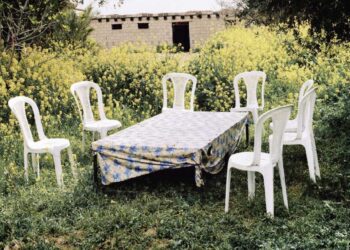Turkey-based Lebanese rapper and writer Bu Nasser Touffar is known for his music that addresses the struggles of marginalized communities with realism and brutal honesty. His songs have become anthems in protests and social movements in Lebanon. Ahead of Bu Nasser Touffar’s upcoming performance in Berlin with Hello Psychaleppo, organized by Al.Berlin, Diana Abbani spoke with him about the significance and challenges of performing in Europe, the complex relationship with Beirut and exile, and his vision for music and rap in times of genocide.
Despite the rejection of your visa application thrice and the considerable effort you put in to obtain it you were eventually granted the right to come and perform here in Europe. What is the significance of coming to Europe at this particular time and performing here in light of the genocide, the rise of fascist rhetoric, the banning of pro-Palestinian demonstrations and the silencing of their voices?
There are several levels to answering this question. Professionally, concerts in Europe are more organized and significant in terms of logistics and revenue, thus opening doors to larger networks and projects. On the other hand, even before the Gaza massacre, as musicians or artists from the “underground” world we constantly find ourselves tied to the conditions and funding from government-affiliated institutions, which makes our journey very challenging. Therefore, being outside this system and achieving this breakthrough means a lot to me personally and it can be an inspiration for many other artists who think of different ways to voice their thoughts beyond imposed paths.
Also, given what we have been experiencing in Gaza, South Lebanon, and anywhere in the world where protests are suppressed, it is crucial that our content reaches people in Europe, to make them feel connected to what is happening there. The interaction with the audience through these concerts gives them a sense of not being isolated from the events in their home countries. This emotional connection is very important. Our concerts are not just musical events; they are demonstrations with significant interaction and political slogans. In the European context, when concerts like these gather expatriates, migrants, and “people of color” under these slogans, it obviously does not please these countries’ governments. It is thus a multi-level victory. Finally, my mother is very happy to see me perform in Europe, which adds another personal but nevertheless significant dimension for me.
In general, it is important for me to perform these concerts now, especially since I’ve been living in Turkey and fully understand the value of connecting with any event from afar. Being the one who facilitates this connection in other countries and alleviates the burden of exile is, moreover, a significant achievement. I went to Switzerland at the beginning of this month, without knowing anyone; yet, the interaction with the production team and the audience was so wonderful I now consider them family. Performing two concerts there made me realize the importance of this kind of interaction.
The situation in Lebanon is difficult and in Turkey, the paperwork is daunting. Traveling to Europe is almost impossible due to the complexities of obtaining a visa. I have a long history with visa issues, having had mine rejected twice by the German embassy and once by the French embassy. Recently, and through friends’ mediation, I succeeded in obtaining a three-month visa from the Swiss embassy, which however only allows me to stay in the country for 45 days in a row, forcing me to go back and forth. In contrast, there are people in Europe who can travel easily, hold concerts in our countries, or come to eat shawarma and return without any trouble, thanks to the privileges inherited from their bloody colonial history.
Therefore, for me, not playing gigs in Europe has become a sensitive issue, one that repeats the Beirut scenario, where I put all my efforts into the city, but then ended up being told I couldn’t continue. Now I try to live off my music and to fulfill my responsibilities towards those I am accountable for. I cannot do this with a few gigs which wouldn’t cover the costs. So, it’s not just about having a gig in a European city but also getting a visa that allows me to move and work and tell the world ‘we are here’.
In 2020, you wrote an article titled “Strangers” about your ambiguous relationship to Beirut, stating: “We truly loved Beirut, but we couldn’t access it.” You also mentioned in interviews that being in Turkey was conducive to productivity and “peace of mind” despite the difficulties of exile. On the other hand, your songs about Beirut, such as “Beirut Disappointed Us,” “Beirut Strangled Us,” “The Era of Change,” “Revenge,” and finally “BiliBalid,” reflect changes in our relationship to the city over time.
Despite the personal and collective grievances against it, there is something dear and complex in our relationship to Beirut, as we constantly seek places that resemble it despite its hideousness and cruelty. This was evident, for example, in the gratification you felt after your last concert in Beirut less than a year ago. Do you still think, as you wrote in the song “Hexaphobia,” “a thousand exiles are better than dying once in my country“? How has the image of Beirut evolved for you today? How do you deal with the reality of exile and the continuous feeling of displacement and detachment?
We speak a lot in rap and the song is filled with texts that document the many traces of our past experiences. I started at 19 and I am now 37. I have been recording songs this entire period and overtime, the subjects I tackled have changed significantly. Initially, Beirut was a place we had to go to, from the village, to look for job opportunities and better options than joining the army or Hezbollah. It was also a place where we faced rejection. Beirut was our enemy.
After a while, I lived in Beirut and its suburbs and I finally understood its relation with the peripheries and the surrounding poverty belts. Then I began to experience living within this belt, under the influence of the de facto parties, and felt the sense of estrangement that starts from home and the surroundings before it becomes an estrangement from the entire country. It is a similar estrangement I might feel when having to change my appearance or clothes before going back home. Estrangement is relative and not tied to geography and distance but rather to the sense of safety and to having the minimum rights. Thus, “a thousand exiles is better than dying once anywhere.” I don’t want to die but to survive, and to survive through music, the only thing I succeeded in.
When I left the city at the end of 2018 and came to Turkey, I was angry and eager to escape. I considered myself a surviving migrant. But moving to Turkey affected my expression and opened different perspectives. I learned a new language and got to know a new musical culture, allowing me to develop my personality and to understand things from a new angle while further freeing me from the constant pressure I felt in Lebanon.
With time and distance, the affection for that place returned, the anger diminished, and the blame became meaningless. Unfortunately, after the Beirut explosion and successive crises, I began to feel that I belonged to this place for the first time while in Turkey. It wasn’t easy to reassess myself, especially since, at that time, I was accompanying my sick father, witnessing how things go in hospitals, and facing the daily crisis struggles. This made me realize that the problem is not just with the city and social relations, nor only with Hezbollah or the government, but it is bigger than that. We create imaginary enemies and engage in futile conflicts. We must start by fixing ourselves. I therefore no longer associate myself with the image of the Baalbek or Lebanese rapper, but as a person who expresses themselves in a certain way and who bears a message. This alleviates my estrangement; we are strangers from the moment we are born, constantly searching for a place to belong to.
Being away from Lebanon and living in Turkey, how have the themes you address in your music changed and have they intersected with other global struggles? What musical relationships have you been able to build?
Having been in Turkey for a relatively long time, the local musical horizon has become clear to me. Most of the people I work with are based in Turkey. With those who aren’t, I communicate remotely over the internet, which is much easier compared to Lebanon. In Turkey, things have been good for me as a transitional station; it is not purely a European country nor purely an Arab country, but a suitable place to be. The music here resembles the music I work on, with its Eastern elements, which we try to mix with Western music in a way that makes sense, without straying too far away from our identity. I have learned a lot and built good relationships. Despite all this, I face some difficulty working with the Turks because my content is deemed not suitable. In addition, as an Arab person, I enjoy a limited level of freedom.
My stay in Turkey gave me a chance to see things from another angle. Instead of being immersed in the country’s problems and trying to vent anger, I can now understand them and seek solutions through my works. In 2022, I worked on a track titled “Safari,” which addressed white supremacy and colonial history in the third world, linking the slave trade from Africa and the genocides in Canada, Indonesia, and Australia with what we’ve been experiencing in our struggles in Lebanon, Palestine, and the region. Despite some initial criticism back then, people reconnected with the content I was discussing after the Gaza war and widespread calls for the extermination of our people.
I realized that music is not just a tool for venting anger but it can be a serious research project that raises important questions and encourages people to think. This gives me a push to continue on this path.
How do you see the role of music and rap in times of genocide, amidst the dehumanization of Palestinians and the exposure of global, particularly European, hypocrisy regarding human rights? Can music and concerts be a means of resistance, healing, and collective therapy in such times?
There are two aspects to the role of music. The first is a very personal one where I can express what I can do and what my role is. At least, I can say that I have done something, whether through the words I say or the energy I give in the concert. Of course, this is not enough, but at least it gives me the feeling that I am not just a passive witness to what is happening. On the other hand, music, especially rap, carries a lot of words, without being a newspaper or conference article but it has the power to last for a long time. In my current concerts, I sometimes go back to old songs I made in 2015 during the height of the Syrian revolution. These songs are used as testaments to certain events, so they are not forgotten. At a time when we are constantly being brainwashed and our priorities rearranged, I can use this music as a means to recharge people and raise their awareness of certain issues.
Currently, there might not be a need to charge people towards the Palestinian cause, but maybe in five or ten years, these songs will bring the issue back to the forefront of our memories and awareness, and influence our decisions.
On a collective level, music brings us together and makes us feel our value as a group. In concerts, a person feels a sense of belonging and safety, knowing he/she is not alone in the face of what is happening. Their voice is multiplied by the number of people around them, enhancing trust as individuals and as a group, charging the anger within and creating a space for expression. Music has always been a fierce catalyst for struggle. Artists and poets have always been repressed because of their significant impact in the short and long term. For example, music played a crucial role in laying the foundations of liberation for African Americans as well as in the revolutions in Tunisia, Egypt, Iran, and Syria, hence the intersectionality of these struggles.
Rap is not really an alien art form to our region, as it can be linked to traditional forms like Zajal and the local musical and poetic traditions. How do you describe the type of language you wish to present through rap? What language might the current moment impose whilst allowing you to imagine a different future?
In the nineties, we imported certain music to understand rap. I officially started my musical production in 2009, but before that, I worked on various musical experiments and released songs informally. I listened to previous experiments from the region, for example, from Algeria, where there were artists working on rap since the 80s and early 90s.
The local identity has always been present in my music, as in my latest musical work, “Melatonin,” where it can be heard in the drumbeats. But the rap I prefer to listen to and create is direct rap, an unembellished rap without metaphors or poetic imagery, like Keny Arkana, Immortal Technique, and Dead Prez. These artists speak about politics directly, as if they were writing journalistic articles, but the difference is that they do it musically.
I grew up listening to this type of music, so this is the direction I write in. Last year, when I held a concert in Beirut, it was the first time I collaborated with Beirut Records who organized the event. This collaboration was different from previous rap concerts in the country. Most of the audience wasn’t the usual crowd but people who connected with the content I presented and wanted to listen to it. This makes me feel comfortable when I write, as I realized I do not need to manipulate words to reach the audience. There is an audience that wants to hear the story as it is, which gives me a safe space.
As for what is happening now, it makes sense to me, and I did not expect otherwise. I only see live examples of what I previously talked about, when people said my music is dark, depressing, and violent. After the crisis and the changes of times, many of those who were part of the middle classes and were bothered at the time by this content now understand and engage with it.
The misery was there but it has expanded to include more people, and those who spoke about this struggle will not change their language, it will only become blunter and more intense. We no longer need to explain; the current events speak for themselves. We witness horrifying stories, images, and videos, and read comments about who is responsible, and in the end, we are always blamed for our own death.
It’s dreadful that in our music, which is supposed to have a bright face, we have to constantly talk about attempts to prevent our killing with such brazenness, not just about our survival, without being given any other choice.








